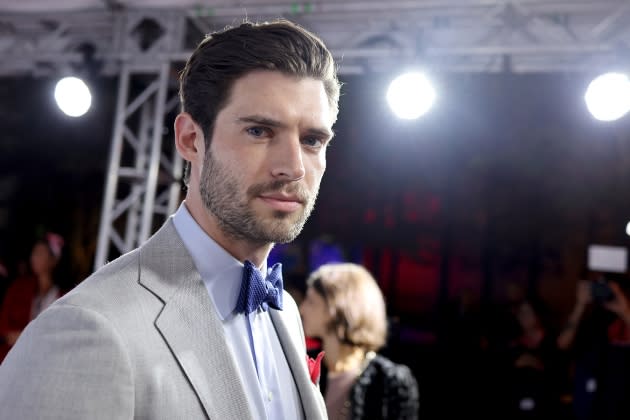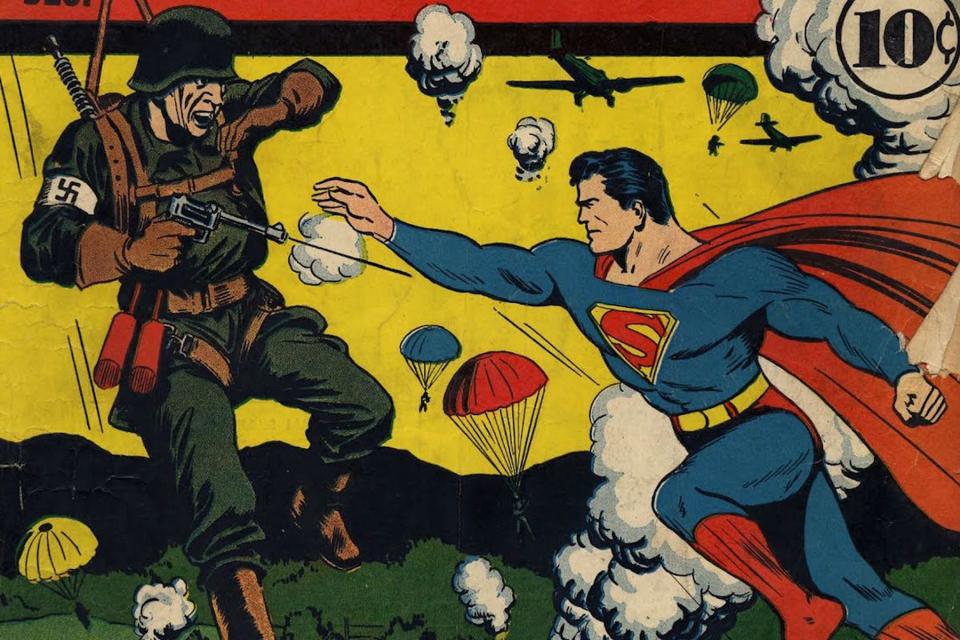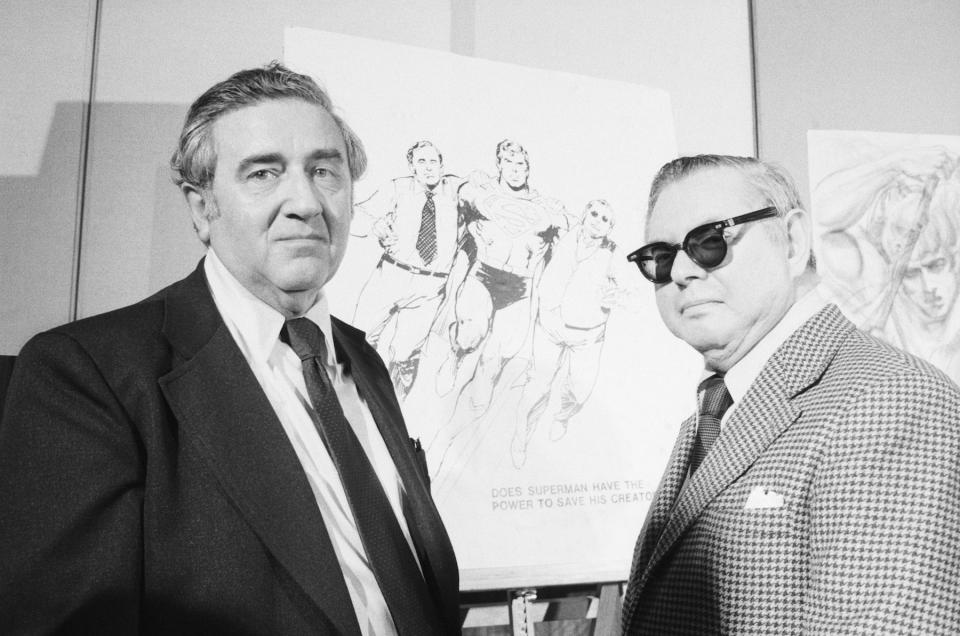David Corenswet Is the First Jewish Superman. Here’s Why That Matters.

David Corenswet may be the first Jewish actor to play Superman, but the Man of Steel himself is as Jewish as matzo ball soup.
As you may or may not know, Superman debuted in 1938, the creation of American and Canadian Jewish teenagers, Jerry Siegel and Joe Shuster. But that authorship is just the beginning. In fact, the entire Superman myth is an American-Jewish fantasy, lifted from numerous Jewish legends and fulfilling the dream of revenge against Hitler.
More from Rolling Stone
Top Trump Adviser Pushed for Drone Strikes on Migrants, New Book Claims
'Past Lives': A Tour of New York City With Greta Lee and Celine Song
Come and learn, people.
First there’s the name. The -El surnames of Superman’s Kryptonian family is a Hebrew appellation for God – prefiguring the gods-are-actually-powerful-aliens/superhumans plots that would feature in Thor, Wonder Woman, The Eternals, and numerous other comics.
More deeply, though, as Roy Schwartz detailed in his rather awfully-titled book Is Superman Circumcised? The Complete Jewish History of the World’s Greatest Hero, Superman’s origin story is a lot like that of the Biblical Moses: sent away by his parents in a desperate attempt to escape certain death, he is raised among humans, but learns that he is not one of them at all, but has a greater destiny in store. His mini-spaceship is even like the little ark that carried Moses down the River Nile.
Siegel also analogized Superman to the Biblical prophet Samson, who also had superhuman strength; Schwartz unearths several explicit references to Samson in the early books.
Clark Kent, too, is a kind of 20th-21st century Jewish archetype: brainy and kind, but also nerdy, awkward, and, in some renditions, a bit of a loser. Only, beneath that bookish exterior, Kent is the ubermensch, the Nietzschean superman with powers far beyond those of mortal humans. It’s the dream of every Jewish nerd: that beneath the surface, there is someone powerful, strong, and cool.
But not only cool. As is well known, Nietzsche’s theories of the superman were co-opted by the Nazis, who depicted themselves as inherently superior, the “master race.” Siegel and Schuster’s reclaiming of the term “superman” is itself an act of revenge — as is, of course, Superman’s primary occupation in those early years: namely, kicking the crap out of Nazis. Which is all he did, all the time. He mocked them, beat them, blew them up. He was a Jewish revenge fantasy writ large, and colored in red, yellow, and blue.
But there’s more. To our ears, fighting for “truth, justice, and the American Way” may sound like old-fashioned patriotism. But in the 1940s, it was controversial.

As Rachel Maddow’s devastating podcast Ultra has shown, the American Right in the 1930s and early 1940s was actually quite enamored of Hitler and the National Socialists, and several Republican senators were literally on his payroll. They saw themselves as fighting the same fight against “cosmopolitans” and non-Christians, which is the same rhetoric used by right-wing extremists today.
Really, we haven’t changed that much. Those who see America as essentially white, Christian, and ruled by alpha males rail against anyone and anything that might disturb that hierarchy – most often against “elites” in politics, finance, or the media who are either explicitly Jewish (like George Soros) or coded as such.
Even one of Ron DeSantis’s leading social media trolls, Pedro Gonzalez, was just exposed to have shared overtly antisemitic tweets with exactly that message. In one, a blond-haired dude in a Pepe T-shirt twists the gigantic nose of a glasses-wearing editor-in-chief named Mr. Heebawitz. “Lmao,” Gonzalez commented.
In fact, looking back on those early days, Superman was very woke. He was known as the “Champion of the Oppressed.” At a time when Republicans opposed President Roosevelt’s liberal programs and opposed entering World War II, Superman supported — in comic books and on a wildly successful radio program — the New Deal, open immigration, and entering the war against Hitler. Some episodes of the radio show lampooned the KKK.
Indeed, in 1940, Nazi propaganda accused Superman of being a Jewish conspiracy to poison the minds of American youth.
Of course, after Pearl Harbor, American sentiment changed, and Superman became a national hero, not only fighting Nazis in the comic books but with his image emblazoned on tanks and planes. At first, however, he was a progressive — even a radical.
And of course, Superman was also an immigrant. As Schwartz puts it in his book, “he is the ethnic guy with the Hebraic name Kal-El who came to America, changed his mannerisms and appearance. He tucks his tallit [Jewish prayer shawl, but Schwartz means Superman’s costume] down into his suit, and he goes around the world like a gentile. So it’s sort of like the ultimate assimilation/assertion fantasy, the ability to decide which part of you should interact with society at any given moment. What is more American than being an ethnic immigrant, and bringing the gifts and uniqueness of your cultural heritage to the greater benefit of the American society?”

As the decades went on, Superman’s Jewishness was a kind of on-again, off-again affair. In the 1970s, lead writer Elliot Maggin incorporated elements of the Bible, Jewish history, and even Kabbalah into Superman’s own story and described his Jewishness as “canon.” There’s a Passover Seder in Superman #400 (1984), Superman defends the Warsaw Ghetto in a time-travel plot from a 1998 issue, and there are references to Jewish angels and magical lore. And in the film Superman II (1980), an old lady exclaims, after Supe rescues a boy from Niagara Falls, “What a nice man! Of course he’s Jewish!”
But as Superman went through various metamorphoses, and corporate overseers, his Jewish particularism ebbed and flowed, depending on who was writing, acting, or directing. Sure, he kept his Ashkenazi pale skin and dark hair, but a lot of the formerly “obvious” references from earlier decades became less obvious, especially as the American Jewish experience evolved as well. Many of us, after all, have been in this country for three generations and may not see ourselves as immigrants anymore. Tragically, many no longer see ourselves as in solidarity with the oppressed.
Personally, though, I always saw Superman as “one of us.” I came of age in the Christopher Reeve era, and absolutely idolized him — Reeve’s Superman was one of my first unarticulated crushes. (Literally, my heart just started beating faster thinking about him.) It wasn’t just the skin-tight costume — though of course it was that — it was what I imagined to be a deeper resonance. Like Reeve’s Clark Kent, I was a pale, awkward, tall nerd who kept saying and doing dumb things. Maybe, I too, had an inner Superman, just one phone booth away from beating up the bullies and saving the world. If only!
So, sure, it’s exciting to have an actual MOT (“Member of the Tribe”) in the Superman role, not to mention with Lois Lane played by Rachel Brosnahan, who is not Jewish by birth or religion but who is an honorary Jew for her years on The Marvelous Mrs. Maisel. While one day, it would be great to have a non-white actor in the role, it’s nice to have a Jewish actor play a role that owes so much to the American Jewish experience. I can only hope that his new Superman brings back the courageous, progressive decency of the original one. We need that now more than ever.
Best of Rolling Stone

 Yahoo Movies
Yahoo Movies 
